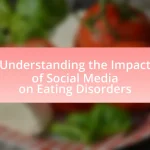Binge Eating Disorder (BED) is a prevalent psychological condition characterized by recurrent episodes of consuming large amounts of food, often leading to discomfort and feelings of loss of control. This article explores the clinical definition, diagnostic criteria, and prevalence rates of BED, highlighting its distinction from other eating disorders. It examines the underlying causes, including genetic, neurobiological, and psychological factors, as well as recent research findings on treatment approaches and the long-term effects of the disorder on physical and mental health. Additionally, practical strategies for managing BED and the importance of support systems are discussed, providing a comprehensive overview of this complex eating disorder.

What is Binge Eating Disorder?
Binge Eating Disorder (BED) is a psychological condition characterized by recurrent episodes of eating large quantities of food, often quickly and to the point of discomfort, accompanied by feelings of loss of control and distress. Research indicates that BED affects approximately 2-3% of the population, making it the most common eating disorder in the United States. Individuals with BED do not regularly engage in compensatory behaviors, such as purging, which distinguishes it from bulimia nervosa. The disorder is associated with various mental health issues, including anxiety and depression, and can lead to significant physical health problems, such as obesity and diabetes.
How is Binge Eating Disorder defined in clinical terms?
Binge Eating Disorder (BED) is clinically defined as a serious eating disorder characterized by recurrent episodes of eating large quantities of food, often quickly and to the point of discomfort. These episodes are typically accompanied by feelings of loss of control and distress regarding the binge eating behavior. According to the Diagnostic and Statistical Manual of Mental Disorders (DSM-5), individuals with BED do not regularly engage in compensatory behaviors, such as purging, which distinguishes it from other eating disorders like bulimia nervosa. The prevalence of BED in the general population is estimated to be around 2-3%, highlighting its significance as a mental health concern.
What criteria are used to diagnose Binge Eating Disorder?
The criteria used to diagnose Binge Eating Disorder (BED) include recurrent episodes of binge eating, characterized by consuming an unusually large amount of food in a discrete period, accompanied by a sense of lack of control during the episodes. According to the Diagnostic and Statistical Manual of Mental Disorders (DSM-5), additional criteria include experiencing marked distress regarding binge eating, binge eating occurring at least once a week for three months, and the absence of compensatory behaviors such as purging, which distinguishes BED from bulimia nervosa. These criteria are validated by clinical research and are essential for accurate diagnosis and treatment planning.
How does Binge Eating Disorder differ from other eating disorders?
Binge Eating Disorder (BED) differs from other eating disorders primarily in its characteristic behavior of recurrent episodes of eating large quantities of food, often to the point of discomfort, accompanied by feelings of loss of control. Unlike anorexia nervosa or bulimia nervosa, BED does not involve regular compensatory behaviors such as purging or excessive exercise. Research indicates that BED is the most common eating disorder in the United States, affecting approximately 3.5% of women and 2% of men, highlighting its prevalence compared to other disorders. Furthermore, individuals with BED often experience significant psychological distress, including depression and anxiety, which can exacerbate the disorder, distinguishing it from other eating disorders that may focus more on weight control or body image.
What are the prevalence rates of Binge Eating Disorder?
Binge Eating Disorder (BED) has a prevalence rate of approximately 1.2% in the general population. Research indicates that this disorder affects about 3.5% of women, 2.0% of men, and 1.6% of adolescents. These statistics are supported by findings from the National Epidemiologic Survey on Alcohol and Related Conditions, which highlight the significant impact of BED on various demographics.
How does age and gender influence the prevalence of Binge Eating Disorder?
Age and gender significantly influence the prevalence of Binge Eating Disorder (BED), with studies indicating that women are more likely to be affected than men, particularly during adolescence and early adulthood. Research shows that approximately 3.5% of women and 2% of men experience BED in their lifetime, highlighting a gender disparity. Additionally, age plays a crucial role, as the onset of BED often occurs in late adolescence or early adulthood, with prevalence rates decreasing in older age groups. A study published in the “International Journal of Eating Disorders” by Grilo et al. (2020) found that younger individuals, especially females, exhibit higher rates of binge eating behaviors, suggesting that both age and gender are critical factors in understanding the epidemiology of BED.
What demographic factors are associated with higher rates of Binge Eating Disorder?
Higher rates of Binge Eating Disorder (BED) are associated with demographic factors such as gender, age, and socioeconomic status. Research indicates that women are more likely to be diagnosed with BED than men, with studies showing that approximately 3.5% of women and 2% of men experience this disorder. Additionally, BED is more prevalent among younger adults, particularly those aged 18 to 29, compared to older age groups. Socioeconomic status also plays a role, as individuals from lower socioeconomic backgrounds report higher rates of BED, potentially due to factors such as stress and limited access to healthy food options. These demographic trends highlight the complex interplay between individual characteristics and the prevalence of Binge Eating Disorder.

What are the underlying causes of Binge Eating Disorder?
Binge Eating Disorder (BED) is primarily caused by a combination of genetic, psychological, and environmental factors. Research indicates that individuals with a family history of eating disorders are at a higher risk, suggesting a genetic predisposition. Psychological factors include emotional distress, such as anxiety and depression, which can lead to unhealthy eating patterns as a coping mechanism. Environmental influences, such as societal pressures regarding body image and access to high-calorie foods, also contribute significantly to the development of BED. A study published in the journal “Psychological Medicine” found that individuals with BED often have a history of trauma or abuse, further supporting the link between psychological distress and disordered eating behaviors.
How do biological factors contribute to Binge Eating Disorder?
Biological factors significantly contribute to Binge Eating Disorder (BED) through genetic predispositions, neurobiological mechanisms, and hormonal imbalances. Research indicates that individuals with a family history of eating disorders are more likely to develop BED, suggesting a genetic component. For instance, a study published in the journal “Biological Psychiatry” found that specific genetic variations are associated with increased risk for BED, highlighting the role of heritability in its development.
Additionally, neurobiological factors, such as dysregulation of neurotransmitters like serotonin and dopamine, have been linked to the impulsive behaviors characteristic of BED. A study in “The American Journal of Psychiatry” demonstrated that altered serotonin levels can affect mood and appetite regulation, contributing to binge eating episodes.
Hormonal imbalances, particularly in ghrelin and leptin, also play a crucial role. Ghrelin, known as the hunger hormone, can increase appetite, while leptin signals satiety. Research published in “Obesity” has shown that individuals with BED often exhibit elevated ghrelin levels and reduced leptin sensitivity, leading to increased food intake and difficulty in regulating hunger.
These biological factors collectively influence the onset and maintenance of Binge Eating Disorder, underscoring the complexity of its etiology.
What role do genetics play in the development of Binge Eating Disorder?
Genetics play a significant role in the development of Binge Eating Disorder (BED), influencing susceptibility through hereditary factors. Research indicates that individuals with a family history of eating disorders are at a higher risk of developing BED, suggesting a genetic predisposition. A study published in the journal “Psychological Medicine” found that genetic factors account for approximately 50% of the variance in binge eating behaviors, highlighting the importance of genetic influences alongside environmental factors. Additionally, specific genetic variants related to neurotransmitter systems, such as those affecting serotonin and dopamine, have been associated with increased risk for BED, further supporting the genetic contribution to this disorder.
How do neurobiological mechanisms influence binge eating behaviors?
Neurobiological mechanisms significantly influence binge eating behaviors through the dysregulation of neurotransmitters and brain circuits involved in reward and appetite control. Research indicates that alterations in dopamine pathways can lead to heightened reward sensitivity, making individuals more susceptible to the reinforcing effects of food. Additionally, imbalances in serotonin levels have been linked to mood regulation and impulsivity, which can exacerbate binge eating episodes. A study published in the journal “Biological Psychiatry” by Kaye et al. (2013) highlights that individuals with binge eating disorder often exhibit abnormal brain activity in regions associated with reward processing, such as the striatum, during food-related stimuli. This evidence underscores the role of neurobiological factors in driving the compulsive nature of binge eating behaviors.
What psychological factors are linked to Binge Eating Disorder?
Binge Eating Disorder (BED) is linked to several psychological factors, including emotional distress, low self-esteem, and maladaptive coping mechanisms. Emotional distress often manifests as anxiety or depression, which can trigger episodes of binge eating as a way to cope with negative feelings. Low self-esteem contributes to a negative body image, further exacerbating the disorder. Maladaptive coping mechanisms, such as using food to manage stress or emotional pain, are also prevalent among individuals with BED. Research indicates that these psychological factors create a cycle of binge eating and emotional turmoil, reinforcing the disorder’s persistence.
How do emotional triggers lead to binge eating episodes?
Emotional triggers lead to binge eating episodes by causing individuals to seek comfort in food as a coping mechanism for negative feelings such as stress, anxiety, or depression. Research indicates that emotional distress activates the brain’s reward system, prompting individuals to consume large quantities of food to alleviate their emotional pain. A study published in the journal “Appetite” found that individuals with binge eating disorder often report using food to manage their emotions, highlighting the connection between emotional states and eating behaviors. This pattern reinforces the cycle of emotional eating, where negative emotions lead to binge episodes, which in turn can exacerbate feelings of guilt and shame, perpetuating the behavior.
What cognitive distortions are commonly found in individuals with Binge Eating Disorder?
Individuals with Binge Eating Disorder commonly exhibit cognitive distortions such as all-or-nothing thinking, overgeneralization, and catastrophizing. All-or-nothing thinking leads individuals to view their eating behaviors in extremes, believing that any deviation from strict dietary rules constitutes failure. Overgeneralization occurs when a single negative experience, such as overeating, is seen as a pattern, leading to feelings of hopelessness. Catastrophizing involves anticipating the worst possible outcomes from eating behaviors, which can exacerbate anxiety and lead to further binge episodes. Research indicates that these cognitive distortions contribute to the maintenance of binge eating behaviors and are often targeted in cognitive-behavioral therapy interventions aimed at treating the disorder.

What recent research findings have emerged regarding Binge Eating Disorder?
Recent research findings indicate that Binge Eating Disorder (BED) is increasingly recognized as a complex interplay of genetic, neurobiological, and environmental factors. A study published in the journal “JAMA Psychiatry” by researchers including Dr. Cynthia Bulik in 2022 identified specific genetic variants associated with BED, suggesting a hereditary component to the disorder. Additionally, neuroimaging studies have shown altered brain activity in regions related to reward processing and impulse control among individuals with BED, highlighting the disorder’s neurobiological underpinnings. Furthermore, research has emphasized the role of psychological factors, such as trauma and stress, in triggering binge eating episodes, underscoring the need for comprehensive treatment approaches that address both biological and psychological aspects of the disorder.
What new treatment approaches are being studied for Binge Eating Disorder?
New treatment approaches being studied for Binge Eating Disorder (BED) include the use of medications such as lisdexamfetamine and the antidepressant sertraline, as well as psychotherapy methods like cognitive-behavioral therapy (CBT) and interpersonal therapy (IPT). Research indicates that lisdexamfetamine has been shown to reduce binge-eating episodes significantly, while sertraline has demonstrated efficacy in improving symptoms of BED in clinical trials. Additionally, studies are exploring the effectiveness of mindfulness-based interventions and the integration of technology, such as mobile health applications, to support behavioral changes and enhance treatment adherence.
How effective are pharmacological treatments in managing Binge Eating Disorder?
Pharmacological treatments are effective in managing Binge Eating Disorder (BED), with certain medications demonstrating significant benefits. Research indicates that selective serotonin reuptake inhibitors (SSRIs), particularly fluoxetine, have been shown to reduce binge-eating episodes and improve associated symptoms. A study published in the Journal of Clinical Psychiatry found that fluoxetine led to a reduction in binge-eating frequency in approximately 50% of participants after 12 weeks of treatment. Additionally, the use of the medication lisdexamfetamine has also been associated with decreased binge-eating episodes, as evidenced by clinical trials that reported a significant reduction in binge days per week. These findings support the efficacy of pharmacological interventions in the management of BED.
What role does psychotherapy play in recent treatment findings?
Psychotherapy plays a crucial role in recent treatment findings for binge eating disorder by providing effective therapeutic interventions that address underlying psychological issues. Research indicates that cognitive-behavioral therapy (CBT) is particularly effective, with studies showing that it leads to significant reductions in binge eating episodes and improvements in emotional regulation. For instance, a meta-analysis published in the journal “Psychological Medicine” found that CBT resulted in a 50% reduction in binge eating frequency among participants. This evidence underscores the importance of psychotherapy as a foundational component in the treatment of binge eating disorder, facilitating long-term recovery and improved mental health outcomes.
What insights have recent studies provided about the long-term effects of Binge Eating Disorder?
Recent studies indicate that the long-term effects of Binge Eating Disorder (BED) include increased risk for obesity, metabolic syndrome, and psychological issues such as depression and anxiety. Research published in the journal “Obesity” by Grilo et al. (2021) found that individuals with BED are more likely to experience significant weight gain over time, which correlates with higher rates of obesity-related health complications. Additionally, a study in “The American Journal of Psychiatry” by Wilfley et al. (2020) highlighted that long-term BED can lead to persistent emotional distress and lower quality of life, emphasizing the need for effective treatment strategies to mitigate these outcomes.
How does Binge Eating Disorder impact physical health over time?
Binge Eating Disorder (BED) significantly impacts physical health over time by increasing the risk of obesity, cardiovascular disease, diabetes, and gastrointestinal issues. Individuals with BED often engage in recurrent episodes of eating large quantities of food, leading to excessive caloric intake and weight gain. Research indicates that approximately 70% of individuals with BED are overweight or obese, which correlates with higher rates of metabolic syndrome, characterized by hypertension, high blood sugar, and abnormal cholesterol levels. Additionally, studies show that the repeated cycles of binge eating can lead to long-term changes in metabolism and hormonal regulation, further exacerbating health risks.
What are the psychological consequences of untreated Binge Eating Disorder?
Untreated Binge Eating Disorder (BED) can lead to significant psychological consequences, including increased rates of depression, anxiety, and low self-esteem. Research indicates that individuals with BED often experience feelings of shame and guilt related to their eating behaviors, which can exacerbate mental health issues. A study published in the International Journal of Eating Disorders found that individuals with BED are at a higher risk for developing mood disorders, with approximately 30% of those affected also experiencing major depressive disorder. Furthermore, untreated BED can lead to social isolation and avoidance of situations involving food, further impacting emotional well-being and quality of life.
What practical strategies can help manage Binge Eating Disorder?
Practical strategies to manage Binge Eating Disorder (BED) include establishing regular meal patterns, practicing mindful eating, and seeking professional support. Regular meal patterns help stabilize hunger cues and reduce the likelihood of binge episodes, as evidenced by studies showing that structured eating can decrease binge frequency. Mindful eating encourages individuals to focus on the sensory experience of eating, which has been linked to reduced binge eating behaviors in research published in the Journal of Consulting and Clinical Psychology. Additionally, professional support, such as cognitive-behavioral therapy, has been shown to be effective in treating BED, with studies indicating that therapy can lead to significant reductions in binge eating episodes and improvements in psychological well-being.
How can individuals develop healthier eating habits to combat binge eating?
Individuals can develop healthier eating habits to combat binge eating by implementing structured meal planning and mindful eating practices. Structured meal planning involves creating a consistent schedule for meals and snacks, which helps regulate hunger cues and reduces the likelihood of impulsive eating. Mindful eating encourages individuals to focus on the sensory experience of eating, promoting awareness of hunger and satiety signals. Research indicates that these strategies can significantly reduce binge eating episodes, as evidenced by a study published in the journal “Eating Behaviors,” which found that participants who practiced mindful eating reported fewer binge episodes and improved emotional regulation.
What support systems are beneficial for those struggling with Binge Eating Disorder?
Support systems beneficial for those struggling with Binge Eating Disorder (BED) include therapy, support groups, and nutritional counseling. Cognitive Behavioral Therapy (CBT) has been shown to be particularly effective, with studies indicating that it can reduce binge eating episodes and improve emotional regulation. Additionally, peer support groups provide a sense of community and shared experience, which can enhance motivation and accountability. Nutritional counseling helps individuals develop healthier eating patterns and understand the relationship between emotions and food. Research published in the Journal of Consulting and Clinical Psychology highlights that a combination of these support systems leads to better treatment outcomes for individuals with BED.


